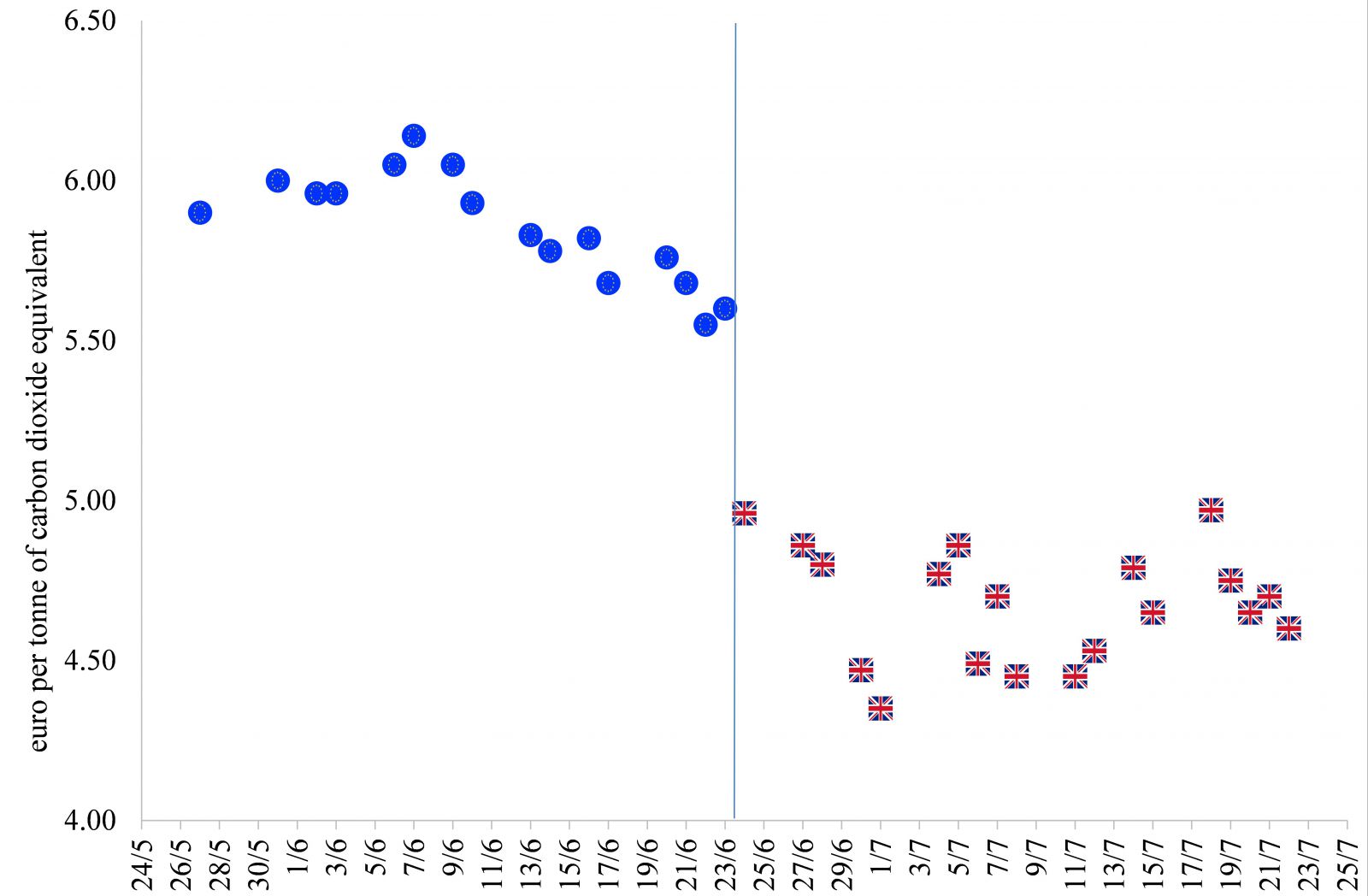ETSexit? UK would be unwise to leave EU emissions market
The United Kingdom may opt to leave the EU Emissions Trading System (ETS) for greenhouse gases. If so, a central plank of UK climate policy will need to be replaced at short notice. The UK is a large importer of emission permits, and meeting its climate policy targets would be much harder and dearer without the EU ETS. The impact on the EU would be limited, although UK permits circulating in the rest of the EU would lose their legal standing between Brexit and 2021. Non-EU countries take part in the EU ETS, and this appears to be the best option for the UK post-Brexit.
Richard Tol is Professor of Economics at the University of Sussex.

Brexit may end the UK’s participation in the EU ETS, the European Union Emission Trading System for greenhouse gases. The UK does not need to leave the ETS when leaving the EU as Norway, Iceland and Liechtenstein are inside the ETS but outside the EU. But the UK would have to leave the ETS in order to completely withdraw from the jurisdiction of the European Court of Justice.
The EU ETS is the world’s largest market for emission permits, covering some 45% of EU greenhouse gas emissions from 11,000 installations. The ETS is currently in its third phase, which runs from 2013 to 2020. Permits are valid for the entire period. Intertemporal fungibility is necessary because energy use and thus carbon dioxide emissions vary with the weather. If permits were valid for a single year, an early cold snap could imply that all permits for that year would be used by Christmas. The chance of this happening is much smaller for multi-year permits.
The multi-year emission budget complicates ETSexit. The easy solution is for the UK to leave the EU on the 1st of January 2021. The third phase of the ETS will conclude with the UK, and the fourth phase will start without it. The preparations for the fourth phase would need to be partly redone, but that is about it. However, HM Government foresees Brexit, and presumably ETSexit, for April 2019. Complications arise.
Previous attempts to adjust the volume of permits exposed the fragile compromise behind EU climate policy.
The overall number of emission permits in the ETS will have to be adjusted downwards to reflect the share of the UK. This is not complicated in principle. Permits are issued and auctioned at regular intervals, and the authorities have two years to prepare once Article 50 is invoked. However, previous attempts to adjust the volume of permits exposed the fragile compromise behind EU climate policy, reflecting the different priorities in Eastern, Western and Southern Europe. It may be that some pre-allocated permits will need to be bought back by, say, the European Commission.
In recent years, the UK has been a net importer of emission permits. In 2013, UK imports equalled 44 million tonnes of carbon dioxide equivalent, and 59 MtCO2e in 2014. The UK aimed to reduce emissions by 232 MtCO2e. Therefore, 18.9% and 25.4% of the UK emission reductions in 2013 and 2014, respectively, were achieved by imported permits. ETSexit means that the UK would have to actually cut emissions. This implies a sharp, upward shock (of at least 40%) in the economic cost of emission reduction.
ETSexit would imply the loss of the UK demand for EU27 permits, but as the UK’s share of EU emission is projected to fall to 8.2-8.4% in 2020, this would lead to a mild, downward shock in the price of emission permits. The UK’s projected emission allocation for 2020 is around 140 million tonnes of carbon dioxide equivalent. This is small relative to 900 million allowances taken out of the 2014-2016 auctions and added to 2019-2020 auctions. Nonetheless, the average permit price at auction was €5.86/tCO2 in the four weeks leading up to June 23, and €4.67/tCO2 in the four weeks after, a price drop of 20%. See Figure 1. Price volatility may increase in the run-up to ETSexit as UK companies sell the permits they stocked for the final years of the budget period, or the options to buy such permits.
 Figure 1. The auction price of greenhouse gas emission reduction permits in the four weeks before the referendum (23 June 2016) and the four weeks after.
Figure 1. The auction price of greenhouse gas emission reduction permits in the four weeks before the referendum (23 June 2016) and the four weeks after.
The ETS is administered by DG Climate Action of the European Commission but monitoring of emissions and enforcement of emission reduction is the responsibility of the Member States. More precisely, the Member State in which the permit originates ensures that permits sold correspond to emissions reduced. The UK has been a net importer of permits, but nonetheless many permits from the UK circulate in the rest of Europe. These permits are issued and regulated by the devolved administrations of the UK. Upon ETSexit, these agencies will need to continue to implement Directive 2003/87/EC and its amendments lest UK permits lose their legal standing in what remains of the EU.
It is beneficial for the UK to stay permanently in the ETS. Upon ETSexit, a major part of UK climate policy disappears. The UK is committed to its emission reduction targets; indeed Westminster has always argued for more stringent targets than Brussels. Without the ETS, it will be more difficult to meet those targets. The UK will have to set-up alternative regulations in time for ETSexit, or adopt more lenient targets for greenhouse gas emission reduction.
UK companies may protest the de facto expropriation of the excess EU permits and futures that they own, or the losses incurred as they sell off permits, at suppressed prices, in the months leading up to ETSexit. Other companies have taken long-term hedges on the energy market, counting on the UK being part of the ETS, or borrowed money against their stocks of permits. The additional regulatory uncertainty will hit investment in energy, a sector that already suffers from an excess in regulatory uncertainty and a dearth in investment.
At the time of writing, we do not know which European institutions the UK will brexit. Leaving the ETS would pose a problem to the EU unless it happens on the 1st of January 2021. Leaving the ETS would be problematic for the UK at any time. It would therefore be advisable for the UK government not to ETSexit, a position shared by at least some in the civil service. If not, it should prepare for a major overhaul of UK climate policy.
16 December 2016
Disclaimer:
The opinions expressed in this blog are those of the author alone and do not necessarily represent the opinions of the University of Sussex or UK Trade Policy Observatory.




